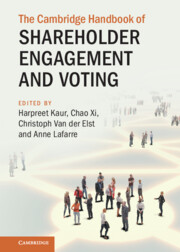Book contents
- The Cambridge Handbook of Shareholder Engagement and Voting
- The Cambridge Handbook of Shareholder Engagement and Voting
- Copyright page
- Contents
- Figures
- Tables
- Contributors
- Preface
- In Memoriam
- Abbreviations
- Introduction
- Part I Asia
- Part II Australia and North America
- Part III Europe
- 13 Shareholder Democracy in Denmark: Contrasting Law on the Books and Law in Practice
- 14 Shareholder Engagement and Voting in France
- 15 Shareholder Engagement in Germany
- 16 Shareholder Engagement and Voting in Greece
- 17 Shareholder Engagement and Voting in Italy
- 18 Shareholder Voting and Engagement in Norway
- 19 Shareholder Voting and Engagement in the Netherlands: The Dutch Institutional Approach
- 20 Shareholder Engagement and Voting in the United Kingdom
- Part IV Comparative Perspectives
- Index
19 - Shareholder Voting and Engagement in the Netherlands: The Dutch Institutional Approach
from Part III - Europe
Published online by Cambridge University Press: 10 September 2022
- The Cambridge Handbook of Shareholder Engagement and Voting
- The Cambridge Handbook of Shareholder Engagement and Voting
- Copyright page
- Contents
- Figures
- Tables
- Contributors
- Preface
- In Memoriam
- Abbreviations
- Introduction
- Part I Asia
- Part II Australia and North America
- Part III Europe
- 13 Shareholder Democracy in Denmark: Contrasting Law on the Books and Law in Practice
- 14 Shareholder Engagement and Voting in France
- 15 Shareholder Engagement in Germany
- 16 Shareholder Engagement and Voting in Greece
- 17 Shareholder Engagement and Voting in Italy
- 18 Shareholder Voting and Engagement in Norway
- 19 Shareholder Voting and Engagement in the Netherlands: The Dutch Institutional Approach
- 20 Shareholder Engagement and Voting in the United Kingdom
- Part IV Comparative Perspectives
- Index
Summary
The Dutch corporate law framework of the public company (the NV) is characterized by an ‘institutional’ approach including a board autonomy principle and the focus on long-term value creation, which is well-established in Dutch (case) law. The Dutch shareholder meeting shares its important position with the corporate board and is not the highest power in the company. Despite that this Dutch framework follows a clear stakeholder model, shareholders have important decision-making rights that are defined in the law. These statutory decision-making rights include topics like (amongst others) say-on-pay, director (re-)elections, capital resolutions, discharging directors, and amendments to the articles of association. Further decision-making rights can be defined in the articles of association, albeit these articles can also limit shareholder voice via oligarchic provisions. Institutional investors systemically own the majority of the shares in the largest listed companies in the Netherlands, which explains the large and increasing focus on institutional stewardship.
Keywords
- Type
- Chapter
- Information
- The Cambridge Handbook of Shareholder Engagement and Voting , pp. 403 - 426Publisher: Cambridge University PressPrint publication year: 2022



